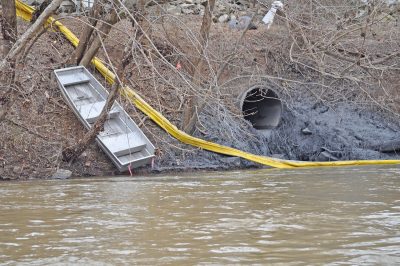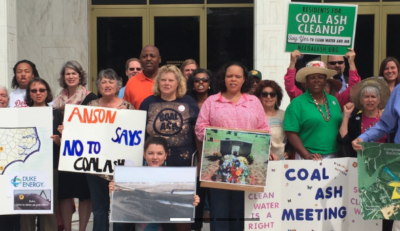Front Porch Blog

Residents of North Carolina celebrate a victory in January 2020 forcing the cleanup of coal ash sites, but also to honor the memory of fellow activists who have died. Photo by Meredith Branscome
On January 2, North Carolina announced an historic settlement with one of the state’s most powerful corporations and notorious polluters, Duke Energy. The settlement requires Duke to dig up nearly 80 million tons of toxic coal ash at six of its power plants and move it to properly lined landfills onsite or recycled.
The announcement brings to a close years of struggle and endurance by citizens from across the state who demanded full redress of the coal ash crisis that had gripped their communities. It was also a rare moment when those of us fighting for environmental justice can mark a definitive victory.
At a gathering last Saturday, we joined with over 40 community members and other activists in Walnut Cove, N.C., for a community celebration of the victory. But we also were gathered in sorrow for the many community leaders we lost during the struggle — including Danielle Bailey-Lash, who lived near one of the largest coal ash ponds in the state, at Duke’s Belews Creek power plant in Stokes County, and who died of brain cancer in late November.
Appalachian Voices has been a mainstay throughout the fight — as advocates pushing regulators and politicians to do more, as scientists testing drinking water wells and surface waters, as litigants in the multi-prong legal fight led by our ally the Southern Environmental Law Center, and foremost as field organizers reaching out to and standing with communities. We are humbled by the courage and grit of the “ordinary” people who spent countless hours and devoted their scarce resources to defending their communities, and we are honored to be part of this fight with them.
39,000 tons of ash in the Dan River

When a Duke Energy coal ash pond failed in 2014, waste entered the Dan River through this pipe. Photo by Appalachian Voices
Appalachian Voices staff had been connecting with communities around the larger of these sites, particularly in Walnut Cove near Duke’s Belews Creek power plant, and Belmont near the G.G. Allen plant. Having responded to the massive coal ash spill at a TVA plant in Kingston, Tenn., in late 2008, we knew the health and environmental hazards coal ash posed. Our aim was to ensure residents had access to complete information about coal ash, not just what Duke or state officials chose to tell them.

David Hairston was born and raised in Walnut Cove. Photo by Dot Griffith. He worries about the health effects to his community caused by Duke Energy’s Belews Creek Power Plant.
Their voices were critical in keeping intense public focus on the crisis long after the Dan River spill. The all-too-cozy relationship between the utility and state regulators (under the administration of then-Gov. Pat McCrory, who had previously worked for 29 years at Duke Energy) came to light in a torrent of state and national media reports. The U.S. Attorney’s office launched a criminal investigation and a year later, in February 2015, reached a plea deal with Duke for $102 million for violations of the federal Clean Water Act.
Foot-dragging and finger-pointing
Under intense pressure from citizens — and not without backslides and political foot-dragging — the N.C. state legislature passed the Coal Ash Management Act in 2014, setting a framework for cleaning up of Duke’s 30-plus coal ash pits around the state by 2029. The Dan River site was among the first on the priority list and was scheduled to be closed by 2019.

Residents impacted by coal ash join together with concerned citizens to rally outside the annual Duke Energy shareholder’s meeting in Charlotte on May 7. Photo courtesy of NC WARN
In the statehouse, lawmakers subsequently tried to weaken the 2014 law. And Duke Energy was spending who-knows-how-much on lawyers to try to fend off multiple lawsuits and lobby for favorable legislation on the issue.

The living room of Amy Brown, who lives near one of Duke’s coal ash ponds, is crowded with bottled water which she is forced to use for drinking, cooking, cleaning and bathing.
Never doubt committed citizens
Time after time, citizens showed up at DEQ public hearings, refusing to accept half measures or excuses. They spent hours studying the proposed rules, talking with each other and with experts to understand the implications, educating others and organizing their communities. They held rallies outside Duke’s corporate headquarters, they sent masses of postcards to the governor. They talked with the press, with researchers and scientists and lawyers. They made allies with Rev. William Barber, who helped amplify their message in the state capital during his “Moral Mondays” events.
“Never doubt that a small group of thoughtful, committed citizens can change the world. Indeed, it’s the only thing that ever has.” — Margaret Mead
In 2015, Appalachian Voices helped bring together local groups and community leaders from across the state for a conversation. From that formed the Alliance of Citizens Together Against Coal Ash, a statewide coalition to unify their voices into a more powerful force on the issue. Their determination, in the face of monumental odds, inspired us and countless others in North Carolina and beyond.
As late as last year, when the state was still trying to force “cap-in-place” as an acceptable resolution at several coal ash sites, ACT Against Coal Ash refused to accept it. They turned out dozens of people to vigorously reject DEQ’s plans at yet another round of public hearings. Their health, their families and their future were at stake. They would not rest.

Now, many of these community members are stepping up for a new cause — to end Duke Energy’s monopoly hold on North Carolina’s electricity system that leaves ratepayers footing the bill for unnecessary projects (read, the Atlantic Coast Pipeline) and exorbitant corporate profits. Duke’s latest maneuver is seeking rate hikes to pay for so-called “grid improvements” that yield little, if any, benefit to ratepayers.
So here’s to ACT Against Coal Ash, and all the many, many people who attended a hearing, made a phone call, gave testimony, sent an official comment on a rulemaking, turned out at a rally, printed flyers, or kept the home fires burning while others went to the frontlines. We salute you, and we’re proud to be with you as we grow a movement for energy democracy in North Carolina.
PREVIOUS
NEXT
Related News

Leave a comment
Your email address will not be published. Required fields are marked *


Leave a Comment